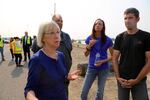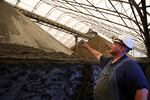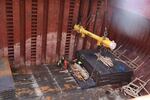For many at the Port of Vancouver, the impacts of President Trump’s escalating trade war are already here.
That’s the message U.S. Sen. Patty Murray, D-Wash., heard from longshoremen and port officials during a visit Tuesday to southwest Washington.

U.S. Senator Patty Murray visited the Port of Vancouver to learn how President Trump's trade war is affecting industry in southwest Washington.
Molly Solomon / OPB
“States like ours are the most trade-dependent states in the nation. We have people whose job depends on this. From the longshoremen to the apple growers: the impact is broad,” said Murray, who spoke with farmers in eastern Washington about the proposed tariffs earlier in the week. “The impact on our economy could be very quick and it could be very tough.”
The U.S. Chamber of Commerce estimates nearly a million jobs in Washington are supported by trade and could be at risk.
Port workers said they’re already seeing less steel on the docks and have seen orders canceled because of new tariffs. The Port of Vancouver is the second largest importer of steel on the West Coast and it makes up a good chunk of their business.
“Usually this yard is filled with steel, and I’m not seeing that,” said Cager Clabaugh, president of the ILWU Local 4 in Vancouver.
Earlier in the morning, Clabaugh said he got a call about a problem at the port’s copper facility. Six-thousand tons of copper ore were set to be loaded onto a ship bound for China next Monday. But a new round of proposed tariffs from China announced on Friday included a 25 percent tariff on copper imports. The ship set to pick up the copper canceled its order and turned back around.
“These mountains of copper ore are going nowhere now,” Clabaugh said.

ILWU Local 4 President Cager Clabaugh says the tariffs are already hurting work at the port. An order for 6,000 tons of copper ore on route to China was recently canceled. The mountains of copper now sit unused in a warehouse at the Port of Vancouver.
Molly Solomon / OPB
When orders get canceled, it’s not only a loss of revenue for the port, it’s also a loss of a job for the people that load and unload the trains, trucks and ships that travel along the Columbia River.
Some longshoremen say they’re cutting back on expenses or are eating out less to save money incase work at the docks slows down.
“One of the biggest concerns is how it’s going to affect my family, our housing, our benefits,” said longshoreman Amber Nelson. “If we lose our standard of living, my family will suffer in ways we have not had to deal with before.”
Former ILWU Local 4 President Jared Smith recently returned to work at the port after recovering from shoulder surgery over the last six months. He said he has to work a certain number of hours to keep his health coverage. If steel work slows down, he worries his benefits could be in jeopardy.
“Our bodies take a hit down here,” Nelson added, saying work at the port is physically intensive. “We need that insurance. We need those things to keep doing what we do.”
On the other end of the port, hundreds of brand new Subaru cars were being driven onto the loading dock. About a quarter of the nation’s Subaru fleet are unloaded at the Port of Vancouver. But a new set of auto tariffs is making port leaders uneasy.

Slabs of steel being unloaded from a ship at the Port of Vancouver in Vancouver, Washington.
Molly Solomon / OPB
Port of Vancouver CEO Julianna Marler said they’re monitoring a U.S. Department of Commerce investigation into Section 232 of the 1962 Trade Expansion Act, on whether auto imports are a threat to national security. It could lead to a 25 percent tariff on imported cars, and would have a huge impact on Subaru, one of the port’s biggest clients. Marler suspects if the tariff goes into effect, the price would likely get passed on to the consumers.
“It’ll either be very expensive or it won’t get done,” Marler explained. “If a manufacturer can’t keep up with the costs, they’ll reduce their labor force and it’ll just be a ripple effect with other indirect jobs.”
Marler said the uncertainty surrounding the trade climate is also affecting future clients at the port.
Earlier this year, Marler and her staff traveled to Asia for a marketing trip. She said many potential business partners were wary of doing business during a possible trade war. She also said that the port has been slow to find a client for a parcel at the port called Terminal 5. The 100-acre plot of land was most recently the proposed site for the failed Vancouver Energy oil terminal project.
“There is a reluctance to make investment in new business because they just don’t know what the climate is going to be like,” she said.
Marler and others at the port worry that the tension around tariffs could lead customers to go elsewhere for products.
“Once you lose business, if they go to another country and are able to start getting a stable supply, it’s hard to get that business back,” said Marler. “And that’s very concerning for the port.”